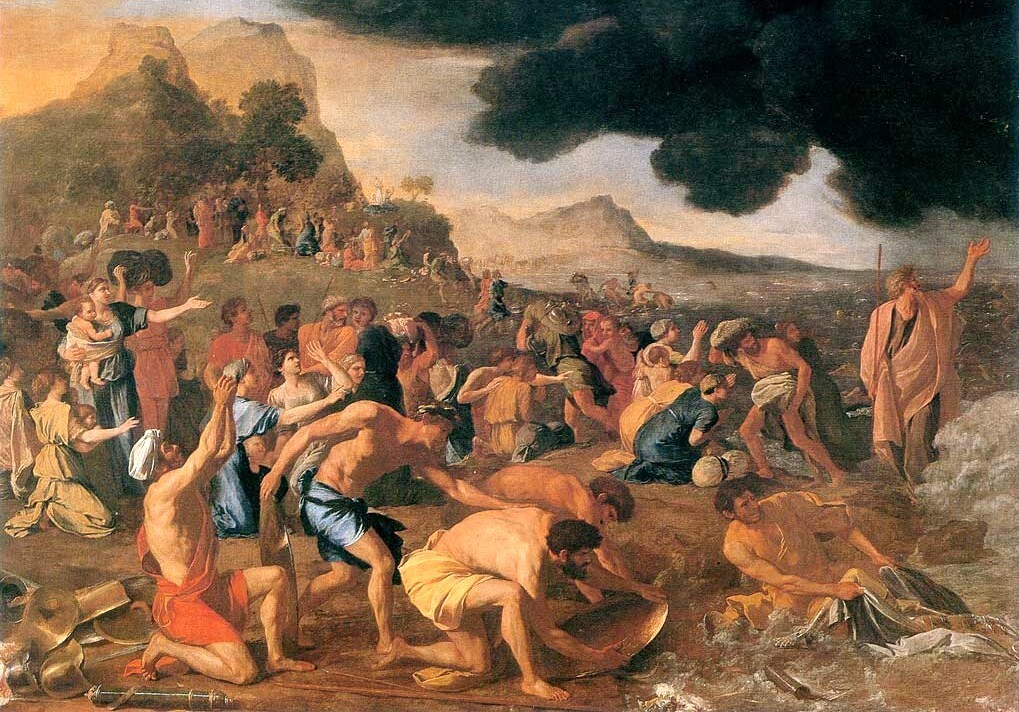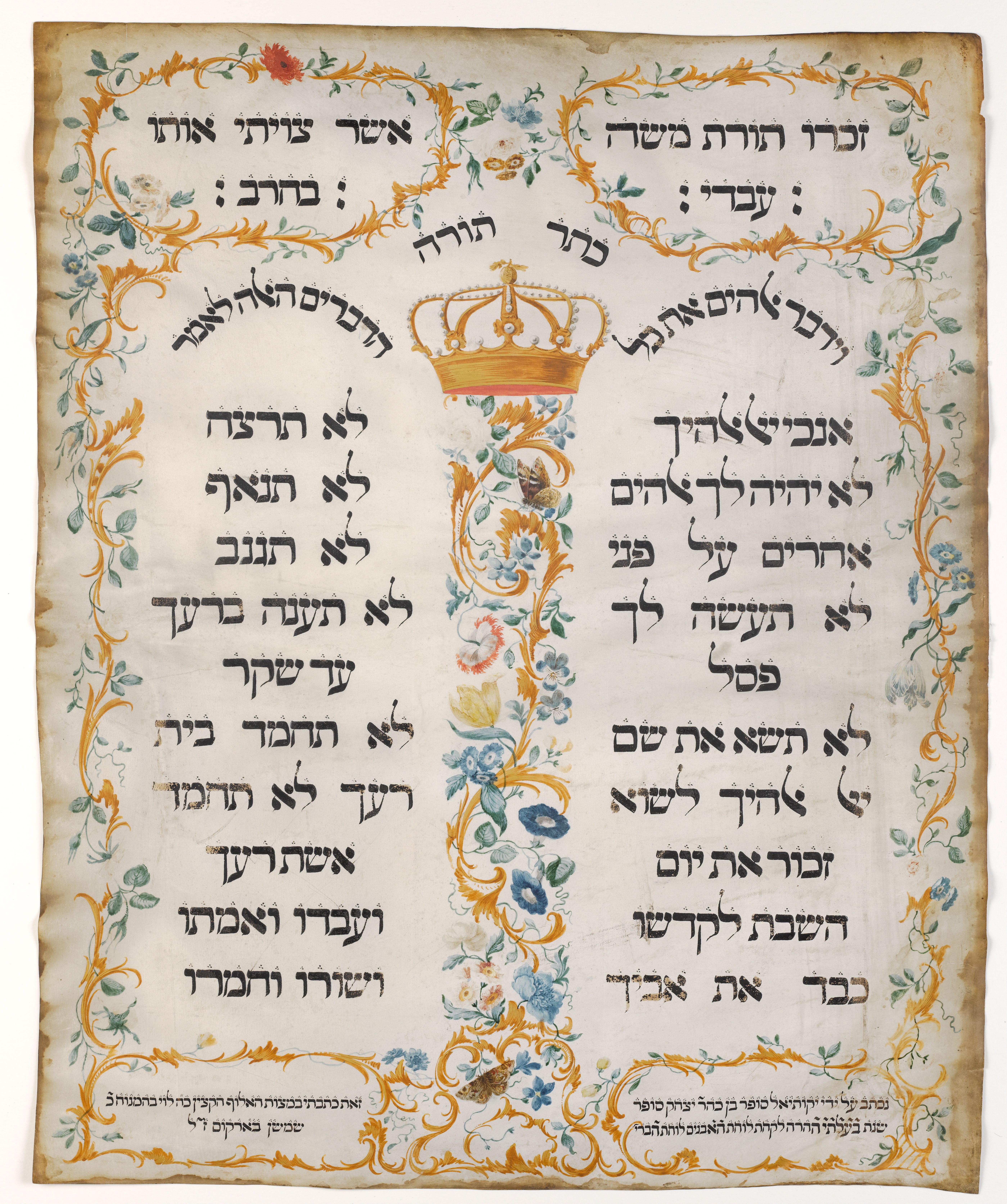|
The Ten Commandments (1923 Film)
''The Ten Commandments'' is a 1923 American silent religious epic film produced and directed by Cecil B. DeMille. Written by Jeanie MacPherson, the film is divided into two parts: a prologue recreating the biblical story of the Exodus and a modern story concerning two brothers and their respective views of the Ten Commandments. Lauded for its "immense and stupendous" scenes, use of Technicolor process 2, and parting of the Red Sea sequence, the expensive film proved to be a box-office hit upon release. It is the first in DeMille's biblical trilogy, followed by '' The King of Kings'' (1927) and '' The Sign of the Cross'' (1932). ''The Ten Commandments'' is one of many works from 1923 that entered the public domain in the United States in 2019. Plot The film has two parts: the Prologue, the epic tale of Moses; and the Story, in a modern setting and involving living by the Ten Commandments. The prologue The opening statement explains that modern society mocked Jude ... [...More Info...] [...Related Items...] OR: [Wikipedia] [Google] [Baidu] [Amazon] |
Cecil B
Cecil may refer to: People with the name * Cecil (given name), a given name (including a list of people and fictional characters with the name) * Cecil (surname), a surname (including a list of people with the name) Places Canada *Cecil, Alberta, Canada United States *Cecil, Alabama *Cecil, Georgia *Cecil, Ohio *Cecil, Oregon *Cecil, Pennsylvania *Cecil, West Virginia *Cecil, Wisconsin *Cecil Airport, in Jacksonville, Florida *Cecil County, Maryland Computing and technology *Cecil (programming language), prototype-based programming language *Computer Supported Learning, a University of Auckland#CECIL, learning management system by the University of Auckland, New Zealand Music *Cecil (British band), a band from Liverpool, active 1993-2000 *Cecil (Japanese band), a band from Kajigaya, Japan, active 2000-2006 Other uses * Cecil (novel), ''Cecil'' (novel), an 1841 novel by Catherine Gore *Cecil (lion), a famed lion killed in Zimbabwe in 2015 *Cecil (Passions), Cecil (''Passions''), ... [...More Info...] [...Related Items...] OR: [Wikipedia] [Google] [Baidu] [Amazon] |
Silent Film
A silent film is a film without synchronized recorded sound (or more generally, no audible dialogue). Though silent films convey narrative and emotion visually, various plot elements (such as a setting or era) or key lines of dialogue may, when necessary, be conveyed by the use of inter- title cards. The term "silent film" is something of a misnomer, as these films were almost always accompanied by live sounds. During the silent era, which existed from the mid-1890s to the late 1920s, a pianist, theater organist—or even, in larger cities, an orchestra—would play music to accompany the films. Pianists and organists would play either from sheet music, or improvisation. Sometimes a person would even narrate the inter-title cards for the audience. Though at the time the technology to synchronize sound with the film did not exist, music was seen as an essential part of the viewing experience. "Silent film" is typically used as a historical term to describe an era of cinema p ... [...More Info...] [...Related Items...] OR: [Wikipedia] [Google] [Baidu] [Amazon] |
Crossing Of The Red Sea
The Parting of the Red Sea or Crossing of the Red Sea (, lit. "parting of the sea of reeds") is an episode in The Exodus, a foundational story in the Hebrew Bible. It tells of the escape of the Israelites, led by Moses, from the pursuing Egyptians, as recounted in the Book of Exodus. Moses holds out his staff and God parts the waters of the Yam Suph, which is traditionally presumed to be the Red Sea, although other interpretations have arisen. With the water dispersed, the Israelites were able to walk on dry ground and cross the sea, followed by the Egyptian army. Once the Israelites have safely crossed, Moses drops his staff, closing the sea, and drowning the pursuing Egyptians. Biblical narrative After the Plagues of Egypt, the Pharaoh agrees to let the Israelites go, and they travel from Ramesses to Succoth. Ramesses is generally identified with modern Qantir, the site of the 19th dynasty capital Pi-Ramesses, and Succoth with Tell el-Maskhuta in Wadi Tumilat, the b ... [...More Info...] [...Related Items...] OR: [Wikipedia] [Google] [Baidu] [Amazon] |
The Exodus
The Exodus (Hebrew language, Hebrew: יציאת מצרים, ''Yəṣīʾat Mīṣrayīm'': ) is the Origin myth#Founding myth, founding myth of the Israelites whose narrative is spread over four of the five books of the Torah, Pentateuch (specifically, Book of Exodus, Exodus, Book of Leviticus, Leviticus, Book of Numbers, Numbers, and Book of Deuteronomy, Deuteronomy). The narrative of the Exodus describes a history of Egyptian bondage of the Israelites followed by their exodus from Egypt through a Crossing the Red Sea, passage in the Red Sea, in pursuit of the Promised Land under the leadership of Moses. The story of the Exodus is central in Judaism. It is recounted daily in List of Jewish prayers and blessings, Jewish prayers and celebrated in festivals such as Passover. Early Christians saw the Exodus as a typology (theology), typological prefiguration of Resurrection of Jesus, resurrection and Salvation in Christianity, salvation by Jesus. The Exodus is also recounted in the ... [...More Info...] [...Related Items...] OR: [Wikipedia] [Google] [Baidu] [Amazon] |
Book Of Exodus
The Book of Exodus (from ; ''Šəmōṯ'', 'Names'; ) is the second book of the Bible. It is the first part of the narrative of the Exodus, the origin myth of the Israelites, in which they leave slavery in Biblical Egypt through the strength of Yahweh, their deity, who according to the story Chosen people, chose them as his people. The Israelites then journey with the prophet Moses to biblical Mount Sinai, Mount Sinai, where Yahweh gives the Ten Commandments and they enter into a Mosaic covenant, covenant with Yahweh, who promises to make them a "holy nation, and a kingdom of priests" on condition of their faithfulness. He gives them laws and instructions to build the Tabernacle, the means by which he will come from heaven and dwell with them and lead them in a holy war to conquer Canaan (the "Promised Land"), which has earlier, according to the Book of Genesis, been promised to the "seed" of Abraham, the patriarch of the Israelites. Though traditionally Mosaic authorship, ascri ... [...More Info...] [...Related Items...] OR: [Wikipedia] [Google] [Baidu] [Amazon] |
World War I
World War I or the First World War (28 July 1914 – 11 November 1918), also known as the Great War, was a World war, global conflict between two coalitions: the Allies of World War I, Allies (or Entente) and the Central Powers. Fighting took place mainly in European theatre of World War I, Europe and the Middle Eastern theatre of World War I, Middle East, as well as in parts of African theatre of World War I, Africa and the Asian and Pacific theatre of World War I, Asia-Pacific, and in Europe was characterised by trench warfare; the widespread use of Artillery of World War I, artillery, machine guns, and Chemical weapons in World War I, chemical weapons (gas); and the introductions of Tanks in World War I, tanks and Aviation in World War I, aircraft. World War I was one of the List of wars by death toll, deadliest conflicts in history, resulting in an estimated World War I casualties, 10 million military dead and more than 20 million wounded, plus some 10 million civilian de ... [...More Info...] [...Related Items...] OR: [Wikipedia] [Google] [Baidu] [Amazon] |
The Ten Commandments (1923)
The Ten Commandments (), or the Decalogue (from Latin , from Ancient Greek , ), are religious and ethical directives, structured as a covenant document, that, according to the Hebrew Bible, were given by YHWH to Moses. The text of the Ten Commandments appears in three markedly distinct versions in the Bible: at Exodus , Deuteronomy , and the "Ritual Decalogue" of Exodus . The biblical narrative describes how God revealed the Ten Commandments to the Israelites at Mount Sinai amidst thunder and fire, gave Moses two stone tablets inscribed with the law, which he later broke in anger after witnessing the worship of a golden calf, and then received a second set of tablets to be placed in the Ark of the Covenant. Scholars have proposed a range of dates and contexts for the origins of the Decalogue. “Three main dating schemes have been proposed: (1) it was suggested that the Decalogue was the earliest legal code given at Sinai, with Moses as author, and the Amphictyony confedera ... [...More Info...] [...Related Items...] OR: [Wikipedia] [Google] [Baidu] [Amazon] |





